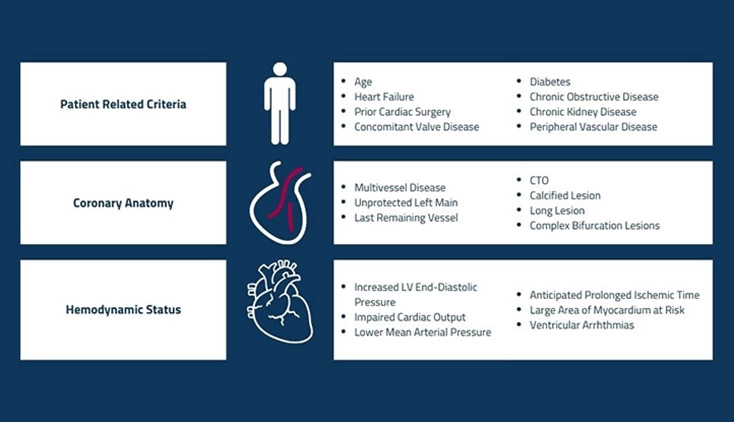Patient Identification

Which Patients May Benefit from Protected PCI?
Impella® heart pumps may provide safe and effective hemodynamic support in elective and urgent high-risk PCI for a broad range of patients with complex coronary artery disease, hemodynamic compromise and comorbidities.
Patients benefit from this minimally invasive option that may:
- Enable more complete revascularization1
- Reduce symptoms and class of heart failure2 and improve LVEF1
- Significantly reduce the overall incidence of post-procedural acute kidney injury (AKI)5
- Reduce number of days in the hospital3,4
- Significantly reduce post-discharge MACCE events (composite of death/stroke/MI/repeat revascularization)6
Navigating Patient Identification in High-risk PCI: Enhancing Patient Outcomes with Selection Practices


Surgical Turndown is Common and Associated with Higher Mortality
Protected PCI may be an option when surgery is not. Consider Protected PCI for patients who are considered too high-risk and therefore turned down for surgery, and for patients who decline surgical treatment.


Underdiagnosed & Undertreated
Many patients with severe, symptomatic CAD remain untreated or undertreated due to comorbidities, increased risk of AKI or hemodynamic compromise. Protected PCI may be an option to help these patients.
References
-
Burzotta, F., et al. (2019). J Interv Cardiol, 2019(5):1-10.
-
O’Neill, W.W., et al. (2012). Circulation, 126(14), 1717-1727.
-
Gregory, D., et al. (2013). Am Health Drug Benefits, 6(2), 88-99.
-
Maini, B., et al. (2014). Expert Rev Pharmacoecon Outcomes Res, 14(3), 403-416.
- Flaherty, M.P., et al. (2017). Circ Res, 120(4), 692-700.
-
Dangas, G.D., et al. (2014). Am J Cardiol, 113(2), 222-228.
Discover More About Protected PCI
NPS-2626
